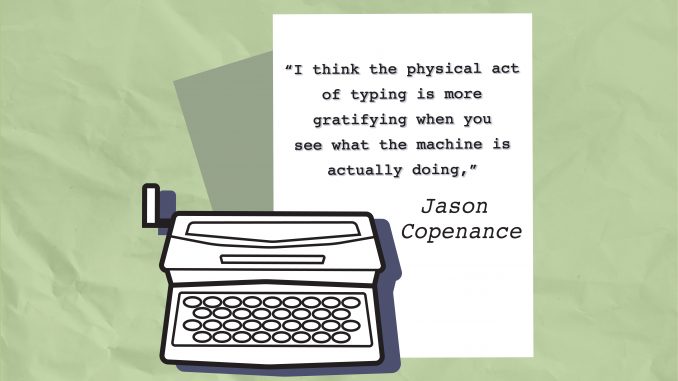

Naturally, my love for writing and my frequent aversion to technology has made me fascinated by typewriters.
I love the way they look, especially because they lack a screen. I’ve seen these machines at antique shops and even contemplated buying one, but I never actually typed on one until a few weeks ago.
My first hands-on typewriting experience took place at the Festival for the People, a three-weekend event from Oct. 13-28 organized by Philadelphia Contemporary, a nonprofit organization for the arts. It included interactive art installations throughout Cherry Street Pier, in Old City.
One installation featured Philly Typewriter, a shop that sells and repairs typewriters in South Philly. The shop attempts to keep typewriters alive through its Public Typewriter Program, which aims to put 2,000 fully functioning typewriters in public locations by the end of 2020.
I applaud this effort. Actor Tom Hanks even recently called this exact shop a “national resource,” the Inquirer reported.
Preserving this classic form of communication helps us appreciate how things used to be.
Bryan Kravitz, the owner and mechanic of Philly Typewriter, was raised in Northeast Philadelphia but went to trade school in San Francisco, where a professor encouraged him to get involved with fixing typewriters.
Kravitz has been fixing them since 1975, but opened his shop in 2017 to repair typewriters and teach others how to do the same through classes and apprenticeships. He created the Public Typewriter Program to bring the joy and historical perspective of typewriters to people who probably have no idea what they’re missing.
“People don’t know what typewriters are,” Kravitz said. “You can just see the look on people’s faces when they have never used a typewriter before, and they sit down for the first time and hit those keys.”
That’s exactly how I felt at the Festival for the People. The typewriter in front of me was more than just a dusty antique. It was a functional way of writing I had never experienced before.
I didn’t realize how badly I wanted to type on a typewriter until I finally had the chance.
Typewriters force you to slow down both physically and mentally because you can’t backspace like you can on smartphones and computers. The keys also require more pressure than a touchscreen or MacBook.
You have to really think about what you’re typing. I challenge Temple University students to give it a try.
These machines are expensive and can be fragile, so people at the public typewriter locations monitor use. At Festival for the People, the monitors were staff members of Philadelphia Contemporary. They handed out paper and helped people use them properly.
Austin Burkey, 27, works at the Philadelphia Contemporary. Burkey said Kravitz worked with the staff and trained them on the proper way to use the machines.
“It’s a really nice installation because people are always tapping on screens and…basically being instantly gratified one way or another,” Burkey said. “This slows you way down and makes you consciously think about spelling, spacing, only hitting one letter at a time.”
Burkey saw children and young people reacting to the installation. Most of them had never seen typewriters in real life.
“They have no idea what it is and are fascinated with it or maybe even a little intimidated by it,” Burkey said.
There’s no reason for a child to know what a typewriter is in today’s world, so without these public typewriters, they might never see one in real life, let alone get the chance to use one. It would be a shame to see these devices go extinct.
But the excitement isn’t limited to children. People of all ages were getting into the installation.
Jason Kopenitz, an adult festival-goer, had never used a typewriter before. He said he enjoyed the tangibility of the typewriter.
“I think the physical act of typing is more gratifying when you see what the machine is actually doing,” Copenance said. “With a computer, you’re just hitting keys. You don’t actually see the internal organs.”
There’s something amazing about watching the “internal organs” as I type, knowing whatever I write can’t be deleted. It creates a sense of physicality and vulnerability in my writing process that I can’t get with a laptop.
Kravitz’s shop is representative of this. It’s a beautiful space filled with typewriters of every size, shape and color.
Everyone should have access to these machines, and by putting them in public spaces and welcoming anyone into his shop to give them a try, Kravitz is creating this opportunity.
We’re always typing texts, emails and papers so quickly and trying to respond to people immediately. It’s nice to slow down every once in a while and appreciate how we used to communicate.



Be the first to comment